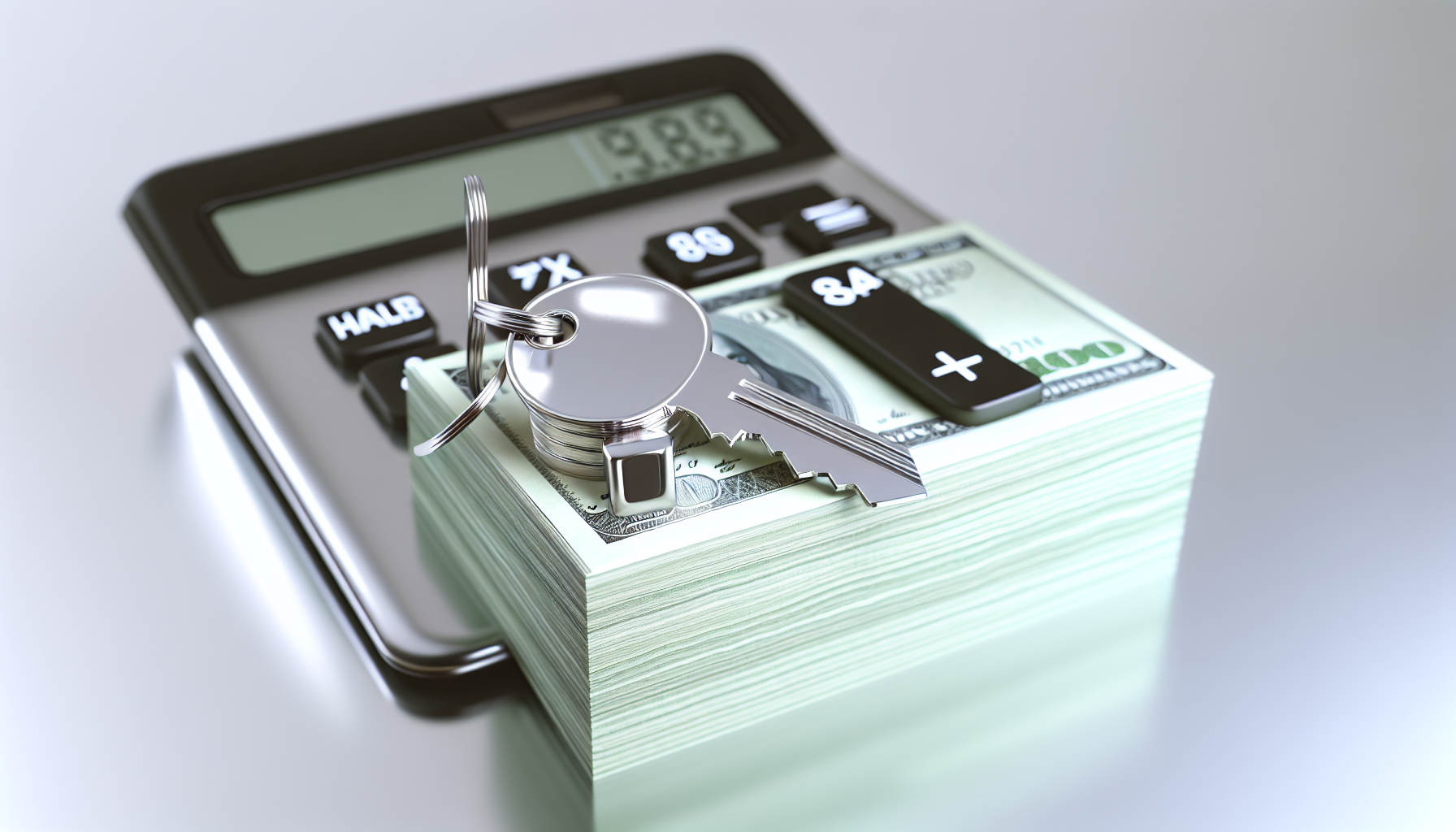How do interest rates affect real estate? This pivotal question impacts everyone in the housing market. When interest rates rise, prospective homebuyers face higher mortgage payments, which can suppress demand and property values. Conversely, lower interest rates typically make home buying more appealing, often resulting in a competitive market with rising prices. Our guide will dissect these dynamics, offering you a clear overview of the mechanisms at play and their strategic implications for those engaged in real estate transactions.
Key Takeaways
Interest rates directly affect real estate demand, property values, and mortgage rates, with low rates increasing demand and affordability, and high rates potentially decreasing property prices and investment appeal.
The Federal Reserve’s monetary policy decisions on the federal funds rate significantly influence mortgage rates and the real estate market, with rate increases often leading to higher mortgage rates and reduced demand for homes.
Rising interest rates necessitate strategic adjustments for real estate investors, including locking in fixed-rate mortgages, focusing on properties with strong cash flows, and considering long-term rentals for ongoing income and potential appreciation.
Understanding the Relationship Between Interest Rates and Real Estate

Interest rates act as a powerful economic instrument in the property market. They play a central role in shaping mortgage rates, property values, and the overall demand for real estate. When interest rates are low, mortgages become more accessible. This increased accessibility can lead to a surge in demand and subsequently higher property prices as more buyers enter the market.
However, the story doesn’t end there. High interest rates may lead to decreased investment demand in real estate. This reduction in demand can lower property prices and reduce competition for properties. Moreover, inflation can also influence home prices. Together, inflation and interest rates play a critical role in shaping real estate investment decisions.
The Role of the Federal Reserve
The Federal Reserve’s monetary policy serves as a compass for navigating the real estate market. This policy, which includes setting the federal funds rate, has a significant impact on the mortgage rates available to the public. The Federal Reserve influences mortgage rates indirectly, mainly through its impact on 10-year Treasury yields, which are closely related to mortgage rates.
But the Federal Reserve’s role doesn’t stop there. When faced with rising inflation, the Federal Reserve may increase the federal funds rate to keep the economy in check. While this addresses inflation, it can lead to higher mortgage rates and a reduced demand for homes. This illustrates how the Federal Reserve’s actions can create ripples that profoundly affect the real estate market.
Mortgage Rate Fluctuations
Mortgage rate fluctuations directly dictate the cost of financing a home. Higher rates typically lead to more expensive borrowing costs. For instance, the peak average 30-year mortgage rate of 7.79% in late October 2023 significantly reduced the purchasing power of homebuyers.
The relationship between mortgage rates and the housing market activity is a dynamic one. Lower mortgage rates have historically increased housing market activity and home prices due to higher demand and affordability. On the flip side, higher rates tend to have the opposite effect.
Homebuyers also have the choice between fixed-rate mortgages, which remain constant over the loan period, and adjustable-rate mortgages, which can fluctuate after an initial fixed period.
The Ripple Effect on Real Estate Investments

Interest rates have a direct influence on real estate investments. They affect the cost of borrowing, which in turn can alter supply and demand dynamics for properties. Rising interest rates can lead to higher costs for commercial real estate investors, possibly discouraging new investments and development.
Rising interest rates can have a negative impact on property investors. Here are some strategies to consider:
Opt for fixed-rate mortgages to lock in a stable interest rate.
Look for properties with strong cash flows to offset higher monthly loan payments.
Ensure long-term fixed-rate financing to protect against future rate hikes.
Reduce overall debt levels to minimize the impact of rising interest rates.
These strategies can help commercial real estate investors navigate the challenges of rising interest rates.
Navigating Rising Interest Rates in the Housing Market

Rising interest rates can create uncharted territories in the housing market. In 2023, we saw the following effects:
The slowest year for existing home sales since 1995
Heightened mortgage rates shrinking the pool of buyers able to afford current rates
Rising mortgage rates leading to increased monthly payments
Homebuyers needing to make larger down payments or devote more of their monthly budget to housing
These factors have had a significant impact on the housing market.
High-interest rates have also led many existing homeowners to hesitate before selling, unwilling to take on new, pricier mortgages. This hesitation adds to a reduced housing supply on the market. Potential Federal Reserve decisions to pause interest rate hikes can improve market conditions, possibly resulting in decreased mortgage rates and increased buyer activity.
Increased Monthly Payments and Affordability

Increased mortgage rates can significantly impact affordability. For instance, an increase in mortgage rates from 3% to 4% causes the monthly payment to rise from around $1,011 to $1,146, representing a substantial financial adjustment for homebuyers. With higher mortgage payments, buyers’ ability to afford homes is strained, necessitating reductions in their housing budget and potentially leading them to target less expensive properties.
This reduced affordability and borrowing power lead to decreased demand for housing, prompting challenges for sellers like extended listing times and the potential for reduced sale prices. This was evident in 2023, which recorded the slowest year for existing home sales since 1995.
Adjustments in Housing Inventory
Rising interest rates can have several effects on the housing market, including:
Putting a brake on new construction
Limiting increases in housing supply
Increasing financing costs for construction projects
Reducing demand from buyers facing higher mortgage rates
Currently, the housing market is facing an imbalance with demand for homes far exceeding the available supply.
Following Federal Reserve rate hikes, there was an observed dip in housing demand and a subsequent decrease in home prices. However, home prices have since recovered and reached new all-time highs by October 2023, reflecting the complex interplay of supply and demand influenced by interest rate movements.
The Impact of Interest Rates on Real Estate Investor Strategies
Property investors, especially impact real estate investors, need to adjust their strategies in response to fluctuations in interest rates. Higher interest rates often prompt investors to gravitate towards long-term investments, particularly in rental properties, which offer ongoing cash flow and potential for future appreciation. Real estate investing, in this context, requires adaptability and keen attention to market trends.
Investors who have the means to purchase properties without financing are less affected by rising interest rates compared to those who depend on mortgages for property acquisition.
Diversification and Asset Allocation
In the realm of property investment, particularly in periods of high-interest rates, diversification serves as a formidable tool. By spreading investments across various asset types, investors can mitigate risks. This diversification can include investing in diverse property types, such as multifamily lots, residential, and commercial properties, offering a buffer against interest rate sensitivity.
During times of high-interest rates, diversification strategies may include increasing investments in rental properties due to greater demand from those unable to afford homes. Investors also diversify their real estate portfolios through different investment vehicles, such as direct ownership, REITs, or private funds.
Seeking Fixed vs. Adjustable Rate Mortgages
For investors, the decision to opt for either a fixed-rate or adjustable-rate mortgage can be critical. Fixed-rate mortgages offer stability with consistent monthly payments, making it easier for investors to budget and plan for long-term strategies in the real estate market.
On the other hand, adjustable-rate mortgages often start with a lower interest rate compared to fixed-rate mortgages, which may be advantageous for investors with short-term hold strategies. However, homeowners with adjustable-rate mortgages may face increased payments when interest rates rise, impacting their personal financial stability and the real estate market.
Local Market Dynamics and Their Interplay with Interest Rates
A range of local market factors can have a substantial impact on housing prices and demand. These factors, including:
job availability
school districts
climate
proximity to urban centers
local amenities
collectively influence the appeal of an area and drive buyer demand. The balance of demand and supply influenced by these local market factors can swing the power dynamics during negotiations more in favor of buyers or sellers.
Demand and Supply Balance
The balance of demand and supply in the housing market can significantly impact negotiations. Lower interest rates generally result in increased demand for homes as they become more affordable and accessible to a wider range of buyers. However, when mortgage rates rise, the demand for home buying often decreases, potentially leading to a reduction in home prices.
Economic Growth and Real Estate Health

The health of the property market is significantly influenced by the stability and growth of the economy. Economic growth leads to increased demand for mortgages, often resulting in higher interest rates, which in turn has implications for the real estate market’s health.
Pro-real estate government policies can bolster national income and infrastructure development, ultimately supporting the real estate market’s vitality.
Long-Term Considerations: Interest Rates and Property Investment
Strategizing for rate variability and comprehending the historical viewpoints on interest rates and property are central to long-term considerations for property investment. In a high interest rate environment, property investors might shift their focus towards investing in rental properties as a long-term strategy.
Elevated interest rates can increase the demand for rental properties as more individuals are priced out of the homebuying market.
Planning for Rate Variability
Investors need to devise strategies to handle the effects of interest rate fluctuations on financing and home equity. Increasing the down payment can lead to securing a lower interest rate and eliminating the cost of private mortgage insurance, developing resilience to interest rate swings.
Performing careful cash flow analysis helps investors account for cost increases due to higher mortgage rates, ensuring ongoing profitability.
Historical Perspectives on Interest Rates and Real Estate
Investors can formulate robust property strategies adaptable to different market cycles by examining historical interest rate trends. Real estate markets, including real estate investment trust portfolios, have weathered periods of high interest rates, evidenced by a continued flow of transactions even when the Federal Funds Rate peaked at 20% in March 1980 and the destabilizing effects of rising interest rates during the 2008 financial crisis.
A comprehensive analysis of past interest rate patterns is crucial for investors aiming to develop resilient real estate strategies that can endure high interest rates and adapt to various market cycles over time.
Summary
In conclusion, interest rates have a profound impact on the real estate market, influencing mortgage rates, property values, and overall market demand. Investors must adapt their strategies to changes in interest rates, focusing on diversification, asset allocation, and mortgage options. Local market factors and economic growth also play significant roles in the health of the real estate market. Long-term considerations for property investment include planning for rate variability and understanding historical perspectives on interest rates and real estate.
Frequently Asked Questions

How will interest rates affect real estate?
High interest rates can make it more challenging for sellers to find buyers, as potential buyers may opt to rent instead of buy. Conversely, when interest rates are low, real estate prices tend to increase.
How rising interest rates hit landlords?
Rising interest rates can impact landlords by increasing their mortgage expenses, leading to reduced profits and making it more costly to acquire or refinance properties. It may also prompt property owners to consider selling their properties in a challenging market.
Is it better to rent or buy when interest rates are high?
When interest rates are high, renting may be a better option short term, as it provides a predictable monthly cost without the risk of rising interest rates. However, in the long term, buying a house can be a good investment for the future.
What is the role of the Federal Reserve in the real estate market?
The Federal Reserve plays a crucial role in the real estate market by influencing mortgage rates through its monetary policy and impact on 10-year Treasury yields. This ultimately affects the availability and affordability of mortgages for the public.
What are some long-term considerations for property investment in relation to interest rates?
When considering long-term property investment, it’s important to plan for interest rate variability and understand the historical perspective on interest rates and real estate. In high interest rate environments, investors may focus on long-term strategies such as investing in rental properties.

Leave a Reply